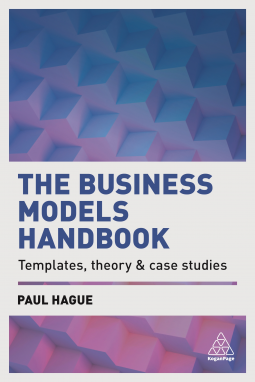
The Business Models Handbook
Templates, Theory and Case Studies
by Paul Hague
This title was previously available on NetGalley and is now archived.
Send NetGalley books directly to your Kindle or Kindle app
1
To read on a Kindle or Kindle app, please add kindle@netgalley.com as an approved email address to receive files in your Amazon account. Click here for step-by-step instructions.
2
Also find your Kindle email address within your Amazon account, and enter it here.
Pub Date Jan 29 2019 | Archive Date Mar 31 2018
Kogan Page Ltd | Kogan Page
Talking about this book? Use #TheBusinessModelsHandbook #NetGalley. More hashtag tips!
Description
Enhance your business and marketing planning and overcome common challenges, with this collection of the most valuable and reliable business frameworks and models.
Business frameworks sit at the heart of every successful business. They add structure and clarity to business problems and can help practitioners overcome the everyday challenges they face. The Business Models Handbook brings together the most helpful and widely used templates and frameworks into a single, invaluable resource. Each chapter focuses on an individual business framework, giving an overview of 50 of the best known frameworks and how it will help an organization grow and be profitable. Each supported by a real-world case study, these include ANSOFF matrix, Price-Quality-Strategy model, Stage-Gate model, Service Profit Chain and many more.
Authored by a leading global market researcher with a background working on over 3,000 different research projects, The Business Models Handbook is an invaluable resource for any student or professional. Online resources include lecture slides that align with each chapter.
Available Editions
| EDITION | Other Format |
| ISBN | 9780749481872 |
| PRICE | $29.99 (USD) |
| PAGES | 312 |
Featured Reviews
 Renwick M, Reviewer
Renwick M, Reviewer
This book does exactly what it says on the tin. It is a reference guide for business frameworks which should appeal to anyone in business who is looking for structure when taking on new challenges. The layout to the book is both simple, but effective and can be read as a go to guide when tackling that next business problem or as a leisurely read to improve overall knowledge. Every chapter is focused on a specific framework and provides sufficent information to let the reader decide whether it is appropriate to their needs. There may be occasions where further supplementary guidance is required, but at that point this reference book has done its job.
Thanks to Netgalley and the publisher for providing me with a copy of this book in exchange for an honest review.
This is a must-have reference for all business executives and managers. Get a copy, familiarise yourself with the various models, use it as a common language and keep it close.
The overall Business Model for a company is unique and there are NO prescriptive definitions for how each company should operate. That’s not THE business model Paul Hague refers to in this book. We do, however, need specific models to help with business strategy and planning activities. This book provides a comprehensive resource of 50 of the most common and successful models available, including those from Porter, Boston CG, de Bono, Kotler, Maslow, Mintzberg and McKinsey.
The structure is excellent and presented in an easy to follow and understandable format. It follows the outline:
What the Model Looks Like
How it Works – Overview and Detail
The Origins of the Model
Developments of the Model
The Model in Action
Some Things to Think About
Notes and References
This consistent chapter scheme enables us to effectively receive and absorb the various elements of information associated with that model. The origins and developments of the model, make really interesting reading and are an excellent touch.
The importance of working with business models is that it provides a method and process to focus our collective thinking around a specific business problem, and keeps everyone talking an agreed language. It is also a mechanism to share strategies with investors, partners, suppliers and customers.
The best Business Models book I’ve come across.
Many thanks to Kogan Page Ltd Publishing and NetGalley for an ARC version of the book in return for an honest review.
I love this guide! And I love the concept of having lots of mini chunks of information all in one book. As a growing business entrepreneur myself it was interesting to see the processes from different systems, without having to read a full book on each. I took lots of ideas from this book and will continue to go back and fourth to the book for insight, when ever needed.
 Gisele W, Reviewer
Gisele W, Reviewer
Good with, lots of different and helpful models that can be used in many business scenarios.
It certainly provided clear and valuable insights into the uses of different models and helped make them accessible to people who don’t use them on a regular basis. There were several models that I hadn’t come across before (real-life job in strategic planning) and several that were explained in a far better way than many previous reference books.
As this was a pre-release version, you couldn’t see the pictorial information that will be provided but there was sufficient content to help you understand the models.
A must have book for any business student or people interested in strategy.
4* It would have been 5* if the diagrams had been visible on the kindle!!
 Ashlyn M, Reviewer
Ashlyn M, Reviewer
I thought this was a very useful book about various businesses models. This should be essential for any business student or businessperson to have on their shelf, so you can quickly reference different models. There is very good insight into how the model has changed over the years along with the benefits and cons of each. I wish my copy had the figures because I think it would have been very useful to visualize as I read it. I highly recommend this book as a reference to various business models.
Readers who liked this book also liked:
Jodi Picoult; Jennifer Finney Boylan
General Fiction (Adult), Literary Fiction, Women's Fiction
John Kotter; Holger Rathgeber
Business, Leadership, Finance, Nonfiction (Adult)












